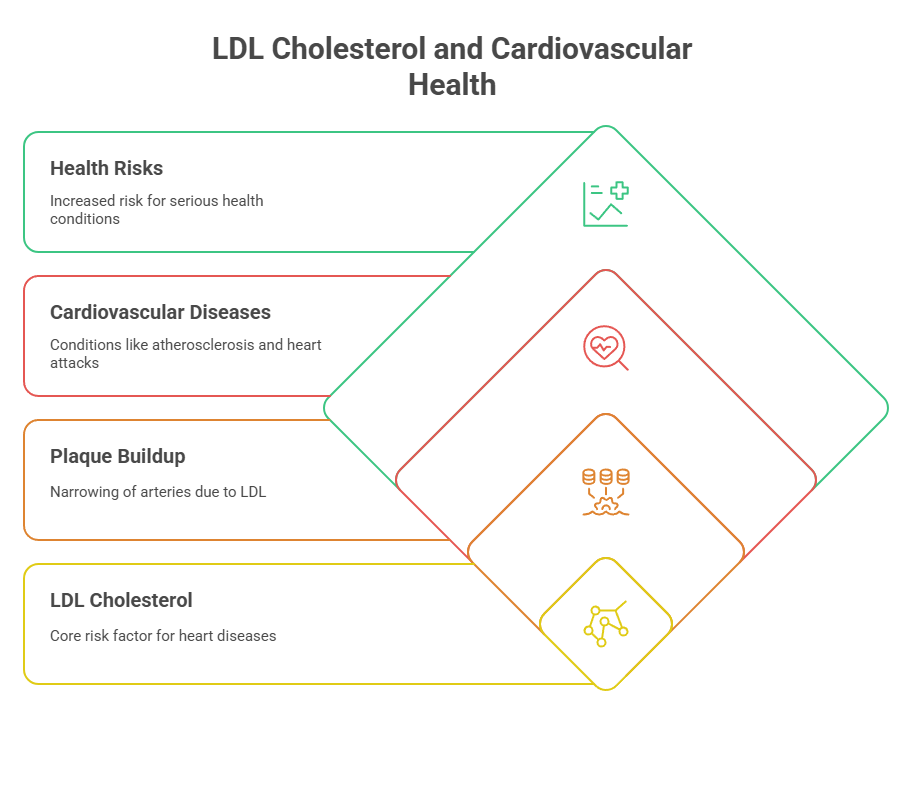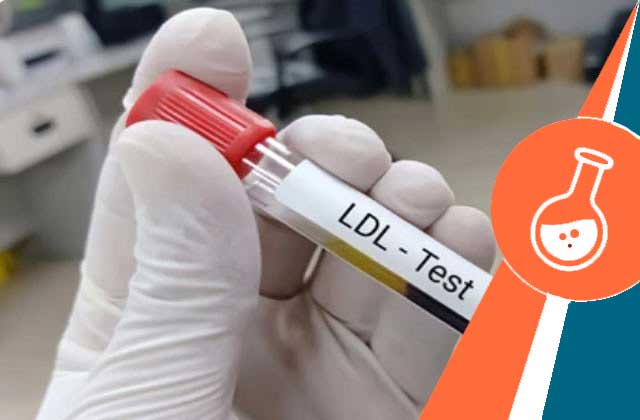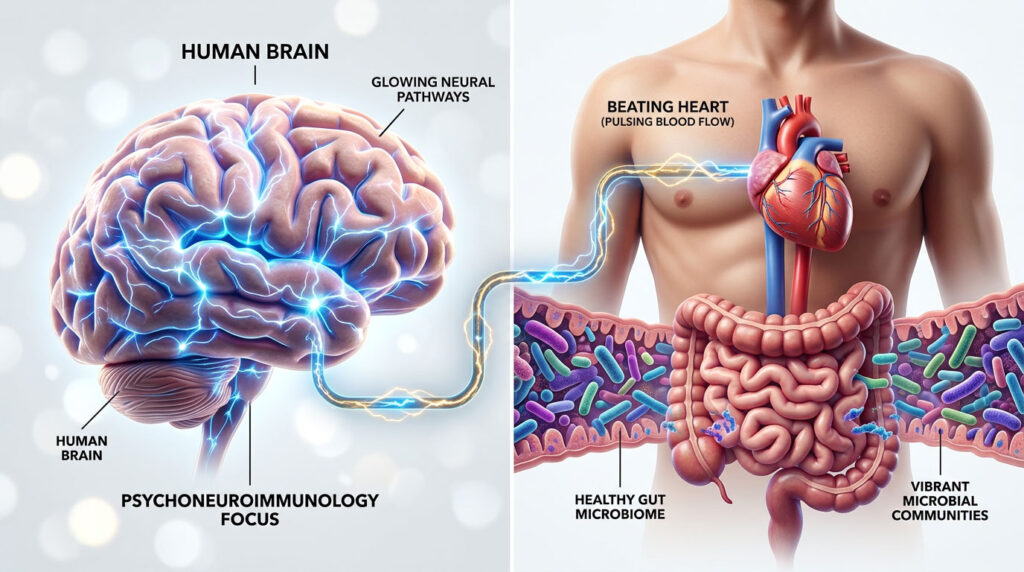
What Is LDL Test
Low-density lipoprotein or LDL cholesterol is deemed as the bad cholesterol as it is counterproductive for your health. Too much of this cholesterol in your body can raise your cholesterol levels in its entirety and risk of developing plaques. These plaques are essentially cholesterol combined with other harmful substances and can clog your arteries, leading to atherosclerosis. Heart diseases, brain strokes, chronic kidney diseases, coronary artery and peripheral arterial diseases are some of the key health concerns that are profoundly linked to high LDL cholesterol levels in your bloodstream.
A LDL blood test aims at measuring the LDL level in your bloodstream. Your healthcare provider will leverage these test insights to determine your risk of developing cardiovascular and other cholesterol-related diseases in the long run.
About LDL Blood Test
Learn everything about LDL cholesterol direct before you book lab test online. Understand the why, how, and what of this test.
Why Do I Need LDL Test?
LDL levels may vary from individual to individual and individuals even with normal LDL cholesterol levels can be susceptible to heart diseases, stroke, kidney diseases, and other health complications. Your healthcare provider will ask you to opt for a LDL test as a part of routine health check-up or to gauge your potential risk of developing these health complications.
You will also be recommended for a LDL blood test if
- You have a higher risk of developing heart diseases, diabetes, etc.
- You have a past history and/or family history of cholesterol-led health complications
- You are leading a sedentary lifestyle, have unhealthy weight, and high blood pressure
- You indulge in excessive alcohol consumption and smoking
You should opt for standalone LDL test or complete lipid profile test periodically to stay vigilant and seek on-time diagnosis, prevention and treatment.
How To Prepare For HDL Test?
To prepare for LDL cholesterol check-up, follow these steps: Consult your healthcare provider, inform them about medications, avoid intense exercise, follow fasting instructions if given, and provide accurate medical history.
What Happens During HDL Testing?
LDL Blood Testing only takes a few minutes.
- As per the scheduled time of the blood test, a lab technician who usually takes blood samples will arrive.
- A thin needle will be used to draw blood from your arm’s vein.
- The needle might cause a mild pinch and some discomfort.
- The lab technician then fills a collection tube with blood and then removes the needle from the skin.
- They place a small bandage on the arm.
Finding HDL Blood Test
Should you book blood test online to check your LDL levels or go to the nearest clinic and get it done by a medical professional? Let’s Find Out
Can I Take LDL Level Test At Home?
Yes, the LDL cholesterol blood test can be taken at home. HealthcareOnTime’s at-home lab testing service in association with Thyrocare, provides a convenient and efficient way to get important medical tests done from the comfort of your place, without the need for a doctor’s visit or a trip to a lab. It is always preferable to consult with a healthcare provider about any concerns regarding your test results.
How Much Does LDL Cholesterol Test Cost?
Are you curious about the LDL test price? At HealthcareOnTime, we offer a budget-friendly solution to ensure to keep you informed about your cardiovascular health
LDL blood test cost can vary depending on several factors, including your location, the healthcare provider, and your insurance coverage. However, we’re pleased to offer this essential test at an affordable rate of just INR 200! Not only are our prices competitive, but they also meet the highest quality standards.
In India, LDL cholesterol test price generally starts from INR 300, but prices can fluctuate based on the specific laboratory and city. Since monitoring HDL levels is crucial for assessing heart health, many healthcare professionals recommend this test.
But here’s the exciting part – HealthcareOnTime goes above and beyond to make healthcare accessible. We offer an incredible up to 30% discount on LDL testing in India. This service is powered by our trusted partner, Thyrocare, and is available in over 4500+ pincodes nationwide.
You can also explore our comprehensive range of cardiovascular health packages with HealthcareOnTime.
| Test Name | Cost (INR) |
| 200 | |
| 470 | |
| 200 | |
| 200 | |
| 1500 | |
| 2000 | |
| 3000 | |
| 500 |
Test Result Interpretation
You received your LDL cholesterol test results but still need help determining if they fall under the normal range. Read this section to understand whether your results are within the low density lipids normal range or not.
What Does LDL Test Results Mean?
A LDL cholesterol test result that shows high LDL cholesterol level may indicate that you are at a higher risk of developing plaque-led atherosclerosis that can affect your heart, brain, kidneys and other organs and lead to cardiovascular, coronary and peripheral arterial diseases, stroke and chronic kidney diseases among others.
Low LDL levels are highly desirable as this indicates that your bloodstream has less of bad cholesterol and more of good cholesterol (HDL), which helps your body cells attain stability and sustenance. Since LDL cholesterol range and its normal level may vary based on an individual’s diet, weight, level of physical activity, age, gender, genetic configurations, it is always recommended to get your LDL cholesterol direct levels checked periodically.
What Is LDL Cholesterol Normal Range?
Less than or equal to 100 mg/dL is considered the LDL cholesterol normal range.
| LDL Cholesterol Level | Remark |
| Less than 100 mg/dL | Optimal |
| 100 – 129 mg/dL | Beyond Optimal |
| 130 – 159 mg/dL | Borderline High |
| 160 – 189 mg/dL | High |
| More than 190 mg/dL | Very High |
[Source]
The higher your LDL levels are at any given time, the higher is the risk of developing cardiovascular ailments. However, if you are steroids and other medications for managing high BP, HIV and other health conditions, your LDL cholesterol levels might fluctuate or remain very high. Consult with your healthcare provider to seek the requisite preventive and treatment measures to achieve low-density lipids normal range.
What Medical Conditions Can Cause High LDL Levels?
High LDL levels and heart, brain and kidney diseases are profoundly interlinked. Some of the key aspects that can raise your LDL cholesterol levels include:
- Unmanaged stress (everyday or occasional)
- Certain medications, such as diuretics, corticosteroids, immunosuppressants, antiviral medications, retinoids, oral estrogen pills, anticonvulsants, antipsychotics and beta-blockers.
- Unhealthy diet and Inactive lifestyle choices: A diet high in saturated and trans fats can raise LDL cholesterol levels, as can excessive consumption of dietary cholesterol.
- Pregnancy: Pregnancy can temporarily raise LDL (Low-Density Lipoprotein) cholesterol levels due to hormonal changes in women, increased fat storage for energy needs, placental cholesterol production, and potential insulin resistance.
- Type 2 Diabetes: People with diabetes mellitus type 2 often have elevated LDL levels, particularly if their blood sugar is poorly controlled.
- Hypothyroidism: An underactive thyroid gland can lead to elevated LDL cholesterol levels due to reduced metabolic rate.
- Polycystic Ovary Syndrome (PCOS): Polycystic Ovarian Disease is a hormonal disorder that can lead to high LDL cholesterol levels, among other lipid abnormalities.
What Medical Conditions Can Cause Low LDL Levels?
While a low LDL cholesterol range is desired, and can be a result of your on-going cholesterol treatment measures, too low LDL levels can be the warning sign of underlying health conditions.
Medical conditions that are linked with abnormally low levels of low-density lipoprotein include:
- Inherited lipoprotein deficiencies – A rare autosomal recessive genetic condition linked with lipid metabolism that comes accompanied by symptoms of high triglycerides, and chylomicronemia (a condition wherein your body does not break down lipids properly).
- Hyperthyroidism – Overactive thyroid gland (hyperthyroidism), Otherwise known as high thyroid hormone levels in your bloodstream, which is often caused due to your body’s autoimmune response.
- Malnutrition: Severe malnutrition and inadequate intake of essential nutrients can lower LDL levels.
- Hormonal Imbalances: Conditions that cause hormonal imbalance in body , such as anorexia nervosa or adrenal insufficiency, can affect LDL cholesterol.
- Chronic Liver Disease: Advanced liver disease, including Liver cirrhosis, can impair the liver’s ability to produce LDL cholesterol.
Opt for on-time diagnosis, healthier lifestyle choices, such as a balanced diet, adequate exercise and restrict alcohol consumption and smoking to attain normal LDL cholesterol levels and minimise your risks for cardiovascular and other health complications.
Why Choose HealthcareOnTime?
Convenience at Your Doorstep
Ever wished for healthcare that comes to you? HealthcareOnTime makes it a reality with doorstep lab testing, cutting out clinic hassles. No more queues or travel stress. Experience at-home sample collection, prioritizing health without time constraints. —your path to health, now just a doorstep away!
Affordable Testing with Thyrocare Partnership
Experience cost-effective lab testing at-home with HealthcareOnTime’s exclusive partnership with Thyrocare. Benefit from competitive prices while ensuring precise results. Our collaboration with Thyrocare Technologies Limited guarantees affordability without compromising on the accuracy and reliability of your lab test.
Comprehensive Health Screening
At HealthcareOnTime, we’ve got your back with our comprehensive health checkup packages! Take charge of your well-being by booking online. These packages empower you to stay ahead, catching potential issues early for timely management. It’s like having a health ally, and making informed decisions for a healthier, happier life.
Disclaimer: Although we have endeavoured to provide accurate information on this page, we strongly recommend that you seek advice from your doctor before relying on any of the test ranges or lab-test recommendations mentioned herein.
More Related Tests
Why To Book with HealthCareOnTime

17 Crores+ Samples Processed

World Class Technology Labs

25+ Years of Trust & Experience











